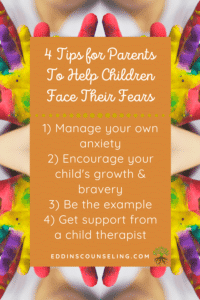July 6, 2020
The Power of Parents: How Can You Help Your Child Face Their Fears?
Written by Rachel Eddins
Posted in Parenting & Family and with tags: child counseling, children
It’s not uncommon for children to be scared about things from time to time.
The world is a new, big, and often exciting place. And the unknown can be scary for anyone. Kids often look to their parents for comfort and security.
While it’s important to assure them of their safety and reduce anxiety, you can also help your child face their fears.
Of course, keep in mind that there’s a big difference between helping your child to be brave and diminishing their feelings. They need to know it’s okay to feel scared, and they need to be assured that everything is okay.
It’s how they respond to their fears that matters, and you can make a big difference.
Managing Your Own Anxiety
When your child feels anxious, it’s normal for you to feel anxious. It’s all a part of the parent-child attachment. No one wants to see their child hurt, scared, or in distress.
So it’s important to understand that your child is looking to you for comfort and guidance during that time. It’s okay for you to feel moments of anxiety, but how you handle those moments will help to show your child they can do the same.
They will be more likely to face their fears if you’re willing to do it, too, and “hold their hand” while they do it.
If you choose to ignore the worries or avoid the things that scare your child, they might learn to do the same as well.
Avoidance is never a good tactic when it comes to working through issues or to help your child face their fears. That’s why guiding your child productively can be so beneficial.
Encourage Their Growth—and Their Bravery
There are various points in children’s lives where they start to do things more independently. It starts very young, from the first steps they take by themselves to the first time they feed themselves, etc.
As children get older, those behaviors should continue to help them learn to trust and believe that they can handle most things on their own. Unfortunately, it doesn’t always happen that way.
They may hold onto certain behaviors and underestimate their own capacity to get through difficulties.
Some children don’t want to “let go” because they’re not sure if they’ll be okay when they do. As a parent, it can be hard to see your child struggle with that.
You might be tempted to hang on as well. You’ll want to keep protecting them because it’s what you’re used to—it’s what you’ve always done.
But it’s important to know the difference between protecting your child and protecting their fears. It’s a balancing act, to be fair.
You might want to help your children avoid their anxieties because it keeps them calm. Many parents do this by “taking care” of a child’s anxieties for them, by being the brave one instead of encouraging their child to be brave.
Be the Example Now!
 To change the way your child looks at their fears, you may have to change first. That means changing part of the attachment system so that other parts naturally follow.
To change the way your child looks at their fears, you may have to change first. That means changing part of the attachment system so that other parts naturally follow.
Take avoidance away in your own life and be an example for your children. Don’t be their crutch of avoidance, either.
When you start to make those changes, you’ll both start to see that they can adapt.
Will it take time? Yes.
But, if you stay the course, your child will eventually see that they can be brave on their own by tackling their fears head-first, without using you to do it for them.
Get Support From a Child Therapist
If you’re interested in learning how to help your child face their fears, seek support. There’s always a lot more to discuss on this subject.
Therapy sessions become a safe, nonjudgemental place where anxious young people can voice their fears and formulate solutions. In addition, parents can either join in on some therapy sessions or seeking individual counseling.
We can better guide our children when we remain open to our own discovery and development.
Eddins Counseling Group has several child and teen therapists that can help your child manage their anxiety and perfectionism. Give us a call today at 832-559-2622 or book an appointment online.

















